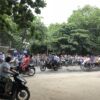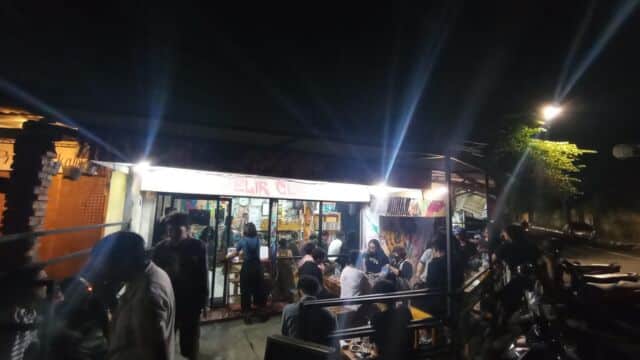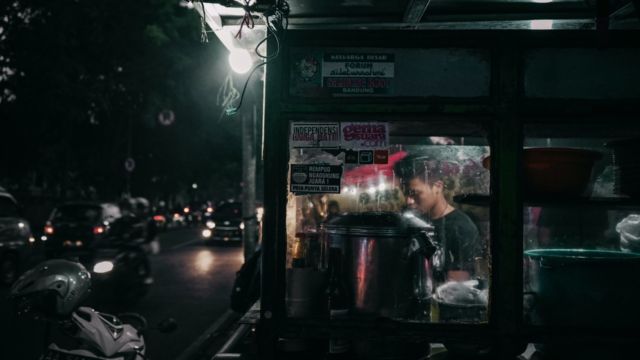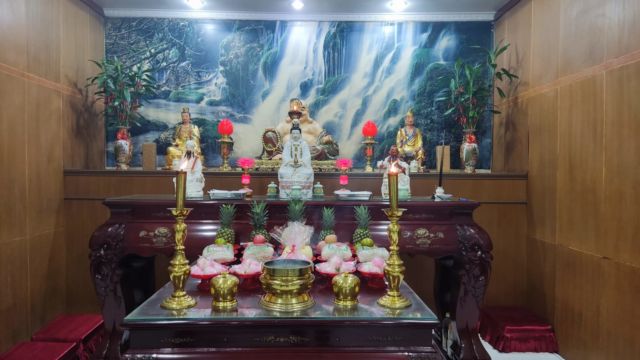Falling Asleep in a Hospital Bed is Tougher-Still if You’re a Migrant
Photo: Wilda Hikmalia
A hospital | 3,098 words
Translated from Bahasa Indonesia by Dan Benjamin
We all want to be well: to have a body that’s healthy, active, and productive. Especially for a young migrant like me, trying my luck here in the national capital Jakarta, alone, without my family: health is the ultimate bastion I need to guard. Since moving to Jakarta from the land of my birth in West Sumatra, I’ve been determined that I must be a success, must remain in robust good shape, and must not place any burden on or give any anxiety to my family, far away on a different island of Indonesia.
Permission from my family to move here was a hard thing for me to obtain – I’ve had to prove the wisdom of the decision continuously to them. Although I’m a woman by myself in a big city, I’ve managed to overcome every doubt that ever gained a foothold. And during thirteen years in Jakarta I have been grateful to have almost never fallen seriously ill. I went to hospital a few times, but just to visit a colleague or friend who was ill or giving birth, or for routine check-ups. While there, I was scared of the thought of being a patient – whimpering, hooked up to medical equipment, lying powerless. Every time I smelled that hospital smell of medicines and treatments, and took in that hospital silence, I said to myself: be well, Wilda.
But my fate was to be different.
For two weeks, my body was not as spry and energetic as normal. I thought it was just regular tiredness. Just a matter of getting a massage, drinking honey, and presto, healed. But, uncomprehendingly, it just went on and on. I got lethargic, my head was spinning, my throat was dry, my shoulders ached. I decided to try cupping therapy. Afterwards, there did seem to be a change. I could go back to the office and busy myself with work.
But after two days, my body again gave out ominous signals. Moving even a few steps I felt like keeling over, I had nausea, vomiting, diarrhea, cold sweats, a terrible cough, until finally I could barely sit. I forced myself to go to a clinic.
A door with ‘GP’ written on it was opened. The doctor welcomed me in and told me to lie on the bed. I told him my problems while taking breaths that were halting and laboured.
‘Please let me check in here, Doc. I can barely stand. I’m dizzy, my stomach feels like a knife’s turning in it-’
‘I’ll give you medicine first, okay? Wait three days first. If it doesn’t get better, I’ll refer you to the hospital.’
‘Do some tests, Doc’. I was urging.
‘I can’t if it hasn’t been three days. I’ll give you medicine for the stomach issues and nausea’.
Huft. I was not very satisfied, because my complaints hadn’t especially been responded to. But what power do I have: that’s protocol. Like it or not, I accepted it.
That night, it turned out that the medicine wasn’t at all adequate. I got worse: I couldn’t sleep at all, I went back and forth to and from the toilet every hour, and my laboured breathing made it hard to lie down. I cried my eyes out. Cursed my ill-health. And finally vomited blood, twice.
The next day, a colleague called and asked me my news. She was shocked by the sound of my breathing. So much so that she soon arrived at my place.
‘Wilda! I’ve never seen you like this! Let’s go! Right now, we’re getting you to hospital! Your face is white!’
What Bu Rina said made teardrops appear on my cheeks. I was afraid to set foot in a hospital. Panicked. But I had also become fatalistic about what was to happen to me.
‘Your desk at work was empty. I figured you were on assignment somewhere’, said Bu Rina, while packing some of my things which I’d need. ‘I didn’t know you were ill’.
Bu Rina is a friend from the same work division. Her desk is immediately to the left of mine. Apart from a professional colleague, she’s also become a chatting-and-story-swapping colleague. Especially because she too is a migrant – she comes from Cilacap in Central Java. When she was young she also fought her way to a place in the capital, just like me. Often our discussions while we work are about our strivings in this our adopted city. How to pursue a career, while helping support our families in our hometowns, together, of course, with how to achieve our own dreams.
‘Do you have any other jackets?’ she asked while putting my clothes into a bag.
‘Yeah. At the top of the drawer. Maybe take another two. I’m afraid I’ll struggle with the hospital air-conditioning’, I said faintly.
I saw Bu Rina messaging on her phone, coordinating. Thankfully, she had a connection: a doctor at a hospital who could help get me admitted immediately without first having to get a referral from a clinic. After hurriedly readying everything, Bu Rina phoned one of our company’s drivers who could take us there.
On the trip to hospital, I cried out on the seat immediately behind the driver while clutching my stomach with both hands. I was scared of vomiting in the car. Tears returned to wet my cheeks when I saw us enter the road that would take us to the hospital.
Our driver took the parking ticket with both hands. The car went straight, turned left, then right, then stopped at a glass door with the letters ‘IGD’ – Instalasi Gawat Darurat. The Emergency Room opened its doors wide for me.
Whoever bears the status of ‘migrant’ will have the same thinking and react in the same way as me. It’s enough for one’s family to know your good news. If something bad comes up, cover it up at first. Because it’s very hard to see your family get anxious and hassled.
The security guard beckoned me into the waiting room. That day things weren’t too busy. There were only a few people sitting there. Bu Rina helped to support me as we entered. I really was no longer capable of walking.
‘Sit here, okay. I’ll go register you’. Bu Rina left.
I lay down across several empty chairs. I hugged my jacket tightly around my body. Thank you, God, that Bu Rina is so nice, accompanying me, helping me.
Bu Rina returned, sat down to my left, patted me on the back. We’re quite far apart in age – 15 years. But that’s never limited our care for each other. Obtaining this sort of love and concern was helping to stop me spiralling into more sadness. I was ill far away from my family at home. Yet in Bu Rina, I felt that I had family sitting right here with me.
Soon a doctor, female, appeared, threw me a smile, asked after me with friendliness, then led me to a different room. I saw a large weight scale. Then several lined-up hospital beds, each with white curtains, several shut. I heard voices, very faintly: I couldn’t make out if it was visitors comforting someone sick, or a patient’s whimpering. The sounds of equipment crept in to disturb the silence. Tit…tit…tit… each machine seemed to make an identical sound. Nurses in white shirts and green pants often passed by, checking behind the closed white curtains.
‘Let’s check you out, Bu Wilda. So what’s the problem?’ The female doctor started to take my temperature. ‘Take off your jacket please’.
‘But I’m cold, Doc’.
‘Just for a minute, then you can put it on again’.
Bu Rina helped me take off the two jackets that were bandaging my body. My clothes were drenched in sweat. The doctor checked my blood pressure and weighed me. After that I was brought to a bed, and she closed the white curtain around me. Entering that space was like having a fearful shadow fall over me.
The female doctor didn’t return. Now it was a male doctor. Asking, again, what I felt like, and since when.
‘So you want to be admitted?’
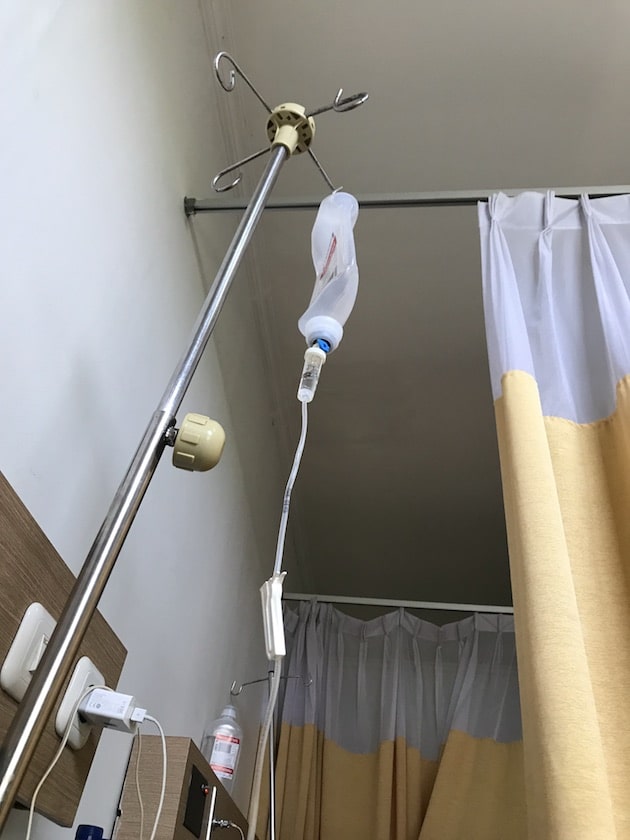
‘Yeah, Doc’, I said, my eyes closed, submitting to fate.
I had an intravenous drip put into my left arm. Nurses came and took a blood sample, performed an electrocardiogram then an X-ray.
‘You’re white as a sheet, Mbak. Get well soon, okay?’, said one nurse.
Bu Rina was still busy with administration. I lay there. My thoughts floated to worst-case scenarios. What will happen to me? Will anyone stay with me later? Should I tell my family in Padang? But what if they worry? Take pity on them. You’ll just cause them worry. But if fate says I should die soon, what then? What will happen to my corpse? Who will arrange for it to be brought back to my hometown?
There wasn’t much I could do, apart from closing my eyes – not that I could sleep at all. From time to time I heard noises from patients around me. Plus the pulsing sounds of the hospital machines, the sobbing of a family, and the recitation of passages from the Quran.
At 3pm, preparations were finally made for me to move to a ward on floor three. My antigen test was negative, alhamdulillah, and likewise for Bu Rina who had managed to get registered as my ‘family’ – alhamdulillah, she was negative too. I was able to feel grateful for that: that in the middle of this illness I was negative for Covid-19, so could be treated in a normal ward.
My bed was pushed along by a male nurse. Bu Rina walked right alongside on the right. A lift door opened, and my bed was pushed into it. I could only stare at the ceiling without knowing what floor we were on at any time. We exited the lift, my bed was pushed left, left again, then left again. Finally, we arrived at my room. Though I still couldn’t really see the space around me: all I saw was another white-coloured hospital ceiling.
I was moved to a bed on the far end of the room, close to a window. I was thankful: provided I stayed alive, I could enjoy sunrise and sunset from this window, even though the view itself was only the hospital parking lot. My intravenous drip was hooked up, my bed was adjusted upright. Bu Rina was organising my things in a small cupboard.
I was the only patient in the room at first. But an hour later someone else came in, a middle-aged woman. She was attached to an oxygen tank. I saw a nurse placing the oxygen tube over her nose. The woman looked weak, exhausted. Her husband briefly glanced over at me. Then, with a brief nod in my direction, he closed the curtain around them.
My days in the hospital passed as a long struggle. Leukocytosis and an infection in my digestive system were the eventual diagnosis. I had medicine intravenously three times a day, and every time, I roared out in pain. And I really could not sleep. I could close my eyes, but I couldn’t sleep.
‘I want to sleep, sister. I’m tired. Since yesterday I haven’t been able to sleep’, I cried to a nurse.
‘Keep an eye on her, Mbak. If the drip starts running out, let us know’, I heard the nurse tell Novi, my friend who had arrived to accompany me.
Novi is my friend from college: I’ve known her since our Bachelors, and we’re currently doing a Masters in Communications together. That morning she had asked me on WhatsApp about an assignment. Without the energy to type a message, I sent her a selfie and a voice message letting her know I was sick. Taken aback, she had phoned, then hurried over from Depok, one of Jakarta’s satellite cities, to visit me.
‘Okay: so don’t even think about college assignments’, she’d said on the phone. ‘I’ll handle everything. Let me know if anything changes, but I’m on my way’’.
Novi’s a migrant too, from Tegal, also in Central Java. Up to high-school she attended school there, cared for by her extended family: after that, she went to reunite with her parents, who had migrated to Depok in search of better work.
‘I know the feeling, Wilda, how it feels to live far away from your parents’, she had said to me once. ‘But don’t ever feel like you don’t have family here. If there’s anything at all, you just let me know’. I remembered this statement very clearly now. And here she was, straightaway hurrying to visit me.
She stayed with me overnight in hospital, with just the few provisions that she’d brought. She didn’t have spare clothes, didn’t even have a phone charger. ‘For your sake, I’m going to give staying here a go. So you’d better get well soon. Don’t dawdle!’ She’s fussy and finnicky, but I always smile when she launches into crass comments like that one. She’s two years younger than me. Exactly the age of my little brother.
I had many mellow moments: naturally I wanted cheering-up. My friends know I’m an active person, into the outdoors, known for never having ailments. Naturally, this became fodder for jokes. Including Novi. When a nurse had just finished giving me my medicine and I cried out in pain, she looked at me with a smile full of scorn.
‘What is it?’ I asked, a little annoyed, my face sullen.
‘I don’t know whether to be sad or laugh’
‘Huh – why?’
‘Are you really sick?’
‘Go to hell, Nov’.
‘Wilda, Wilda… You thought a staycation at a hotel would be too boring, you wanted to try a staycation at a hospital, did you?’
It turned out that my friends and work colleagues really care about me, really love me. They took it in turns to keep me company in hospital, they asked how I was doing. They were all there for me, they all helped me. I never failed to be moved. Far from my family, I didn’t feel alone.
‘You have very good friends, Mbak’, said Bu Titi, the patient sharing the room with me, who was finally sitting up and responsive. ‘I said to my husband earlier, look at that, the girl over there has a constant rotation of people looking after her. And it turns out you’re a migrant’.
Eventually, Bu Tuti and I started to yarn. She was by now not needing oxygen, could go to the bathroom by herself and eat, though just a little.
‘I’m a regular at hospitals, Mbak. Originally for gastric acid, now it’s widened to lots of things’, she said, still weakly. ‘It’s tiring, you know, back and forth from hospitals, medicine this, medicine that, but what can you do?’
Yet I could see the toughness in her face. I could imagine her fight to resist sickness, back and forth between Jakarta hospitals and her home in South Tangerang, another satellite city of Jakarta. She was warm and spiritedly shared stories with me. She even unhesitatingly let me turn off the AC in the room because the cold was affecting me. I saw her occasionally waving some papers against her face, yet she never got mad at me for making her hot and stuffy. She also never complained about my friends who passed through continuously: she even seemed moved at how I, a migrant to this city, had people who came to see me.
For almost a week in hospital, I didn’t tell my family back home anything. I didn’t have it in me to give bad news to them. Once I tried to phone my father, intending to ask him to pray for me to quickly recover. But when the phone got answered, I heard: ‘I’m taking a holiday, staying with your brother. I’m tired from work, I want to relax a few days’. I didn’t have the heart to disturb his rest.
I thought also to phone my aunt, to tell her. But I could imagine how she would get upset and panic. Let’s not have my family rush from Padang to Jakarta to see me, I thought. Where would they stay? How would they get here? Who would organise it all? So a lot of family WhatsApp chats I simply neglected to answer. It seems to me that whoever bears the status of ‘migrant’ will have the same thinking and react in the same way as me. It’s enough for one’s family to know your good news. If something bad comes up, cover it up at first. Because it’s very hard to see your family get anxious and hassled.
‘I was so sad to look at you the first couple of nights’, said Bu Titi. ‘You couldn’t breath well, you were shivering, not to mention the back-and-forth to the toilet. Later, after you get better, you guard your health, Mbak. Don’t forget to eat, don’t get too stressed, don’t tire yourself out’.
‘Yeah, Bu’, I said. ‘I’ve already promised myself’.
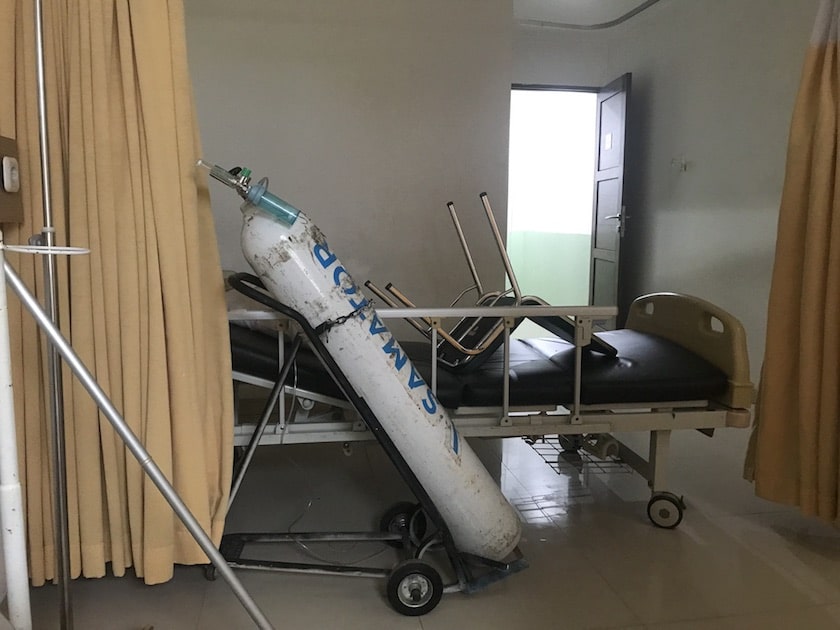
‘I’ve already been nine years sick like this. Lots of entrance doors to hospitals I’ve passed through. Guard your health, Mbak’.
In the hospital, I still found myself feeling grateful. Kind gesture after kind gesture presented themselves to me. Bu Titi’s counsel filled my days – until finally, it was she who was first to be sent home.
‘Later let’s WhatsApp, okay, Mbak? Believe in yourself, keep your spirits up, soon you’ll go home!’ She said goodbye, a smile playing on her lips as her wheelchair left the room.
I took a minute to stare at a sunray outside the window. Tried to calm myself, and to tell myself: don’t be sad.
I endured that nightmare in the hospital. My symptoms gradually faded. Finally, the doctor gave me the all-clear.
That afternoon, I packed my things. I folded up the mat my friends had slept on during the nights, cleaned out the cupboard, made sure I wasn’t leaving anything behind. While waiting for my discharge documents to be completed, I looked at the door to my hospital room. It was not shut firmly. It had deliberately been left open. Silently, alone, I stared at that door.
I thought: This was my first time here, and I want it to be the last. I do not wish to make other people unsettled and anxious. Let alone when I’m living far from home: I don’t want to worry my family. I am grateful for this lesson. All this was quite enough. Thankyou kindly.
© Wilda Hikmalia
English translation © Dan Benjamin


